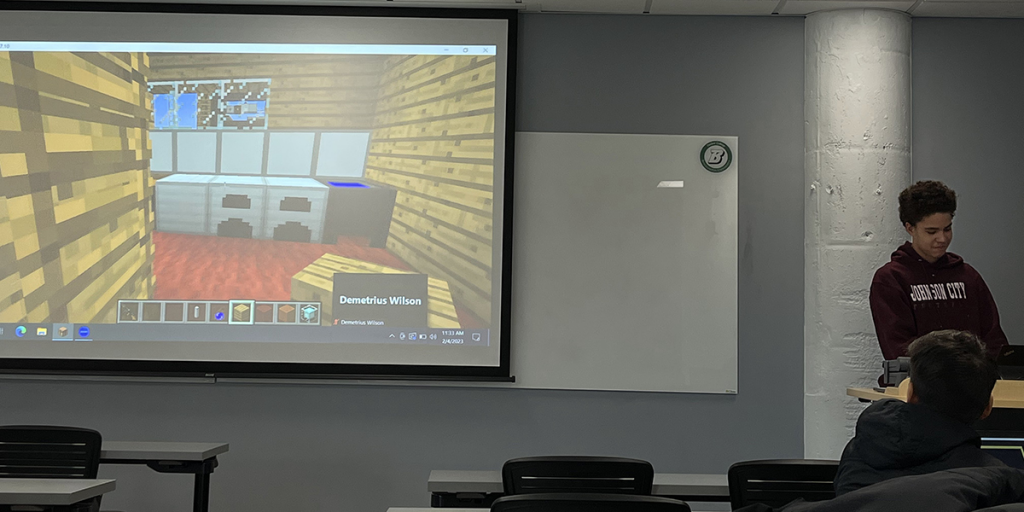Students in the Science and Technology Entry Program (STEP) are learning engineering through Minecraft.
The workshop series is taught by Ning Zhou, an associate professor of electrical and computer engineering at Binghamton University. According its website, the STEP program offers “academic support, retention services and post-secondary guidance to New York state historically underrepresented and financially disadvantaged middle and high school students,” and aims to prepare students planning to pursue an education in STEM fields or licensed professions. Class sessions for these students take place on Saturdays in the Decker School of Nursing and Health Sciences building in Johnson City.
Zhou and Tawsif Ahmad, a graduate research assistant, worked with STEP to offer five 1.5 hour-long lecture sections, one field trip, one tour of a utility control center and one student competition in the workshop. Zhou shared why he believes basic electrical engineering skills can be obtained through the video game.
“Minecraft is a flexible, interactive video game which allows modifications to implement some logic and build models,” Zhou wrote in an email. “Leveraging the Minecraft World of Power developed by Cyber Resilient Energy Delivery Consortium (CREDC), [Ahmad] and I built a virtual mini power grid in Minecraft to mimic and illustrate the functions and features of a modern power grid. Also, students can build their own generation, transmission and appliance to understand how the power grid works and how renewable generations are making it more sustainable.”
Ahmad set up the classroom environment for the game, which allows students to play and interact on a common platform and create lesson plans on how to build a smart house. Ahmad set up a Minecraft server that had the game installed, as well as the necessary mods required for the World of Power — an “educational Minecraft world where students explore electricity generation and delivery,” according to the CREDC website. The workshop was supported by the U.S. National Science Foundation (NSF) to develop ideas and techniques to broaden the impact of technology.
“This workshop aims to introduce the basics of the power grid to the students in a gaming environment,” Ahmad wrote in an email. “We know that students this age are attracted to video games. We chose Minecraft because Minecraft has proven effective in teaching students basics about any branch of science and technology. Several lesson plans are already developed, such as physics, chemistry, architecture and coding.”
According to Ahmad, the World of Power has all the basic components of a power system including coal, natural gas, solar, wind, nuclear, transmission and distribution substations, switching, logic circuits and load. The game demonstrates how utilizing transmission cables can bring power from the grid to a house, as well as how energy storage systems — like a battery — work with solar panels and wind farms.
Zhou emphasized that the workshop provides students with insight into career opportunities related to power grids.
“I hope that through the workshop, the students will understand how the power grid functions and how renewable energy in the power grid help our environment,” Zhou wrote in an email. “More importantly, I hope that the students will be aware of the career opportunity in the power grid, and may consider the related areas for their future college studies.”
Nathan Halsey, a junior majoring in English, said he thinks that real-world engineering challenges cannot be displayed in Minecraft.
“It doesn’t have a robust physics engine,” Halsey said. “These skills are limited to the game environment and do not necessarily translate to real-world engineering applications.”
Marty Dolan, a senior majoring in English, had a different view, stating that the game’s block-based building system assists with simple concepts that introduce a fun and engaging activity for young adults.
“Another advantage of using Minecraft is the ability to visualize and test different concepts in a virtual environment,” Dolan said. “The game allows you to explore and experiment with different ideas without the limitations of physical materials or space.”



